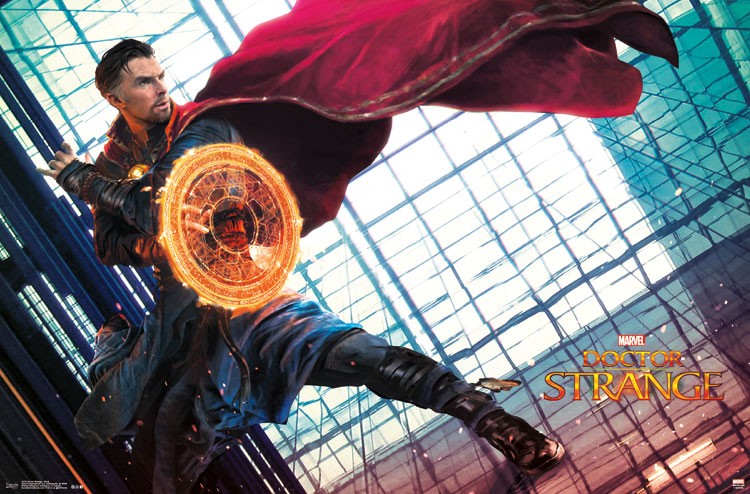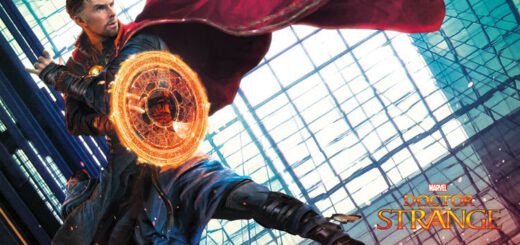Box Office Democracy: Doctor Strange

I assume at some point in the future of the Marvel Cinematic Universe we’re going to come across a threat that unites every character in one movie to fight against it in some budget-busting assembly of talent. I am starting to dread this moment because between Tony Stark, Peter Quill, Scott Lang, and now Stephen Strange, I can’t imagine anything could ever get done between giving all four of them chances to show how little they care about anything that happens in favor of getting in some quip or another. Ironic detachment has become the house style in the MCU, and I’m not sure why Doctor Strange was my breaking point but it was. I’m sick of people saving the world by not caring about it.
It’s not that Benedict Cumberbatch is the problem with Doctor Strange. I found him surprisingly acceptable playing a native New Yorker. He isn’t bad at doing pithy dialogue and this might be projection on my part because he’s English but he’s masterful at appearing above it all. He does a good job climbing over the mountain of unlikability the script puts in his path. Honestly, I’m not sure at what part of “arrogant doctor crashes his supercar while rejecting pleas from sick people to get help” is supposed to make us think he’s a good guy, but his subsequent petulant rejection of all of the advice of his doctors so he can regain the use of his hands so he can go back to being a jerk of a surgeon doesn’t do it either. Stephen Strange is an unlikable crater in the middle of Doctor Strange, but Benedict Cumberbatch is just reading the words off the page.
I don’t like Tilda Swinton as The Ancient One. I don’t like that she’s playing an Asian man and even though they go out of the way to say she’s Celtic, there’s nothing she does in the entire film that isn’t out of the mystical Asian man playbook. I think it’s cowardly that Marvel changed the character from Tibetan so that they could have an easier time accessing the Chinese film market. All the talk of censorship I’ve seen in media these past few years— we get actual government intervention in a movie, and so few people seem to notice.
The rest of the cast is great. Chiwitel Ejiofor is too good an actor for the small part this movie asks of him. He wrestles with his morality over the course of this film and you can see the conflict on his face and in his posture in a way you just don’t see in genre films. He’s deserving of more, and I trust if we get a sequel we’ll get more of him. Benedict Wong is also excellent in a small part. He has a great physicality in a movie dominated by bodies skinnier than a life dedicated to martial arts would suggest. He is the focus for much of the humor in the second act and he carries it well. Mads Mikkelsen wouldn’t have been my first choice for a magical martial arts bad guy but I’m thrilled to have been proven wrong. Because of the magic roots (and the liberal use of stunt doubles) it’s not like he has to carry any of the difficult work himself, and it gives us a gifted actor skilled at playing menaces to carry the heavy weight a villain must shoulder in a superhero film. The best part of the entire film is a quick comedic exchange between Cumberbatch and Mikkelsen, and I’m not sure anyone but Mikkelsen could have made it work.
The story is as predictably lifeless as one would expect from a superhero origin story these days. Bad thing happens, person gets extraordinary power, some sort of betrayal requires that power to be directed against evil, and then there’s a new status quo. I’ve seen this movie dozens of times now and there’s nothing new or exciting about the way it’s written up here. The been-there-done-that feeling also extends to the special effects. I’ve read rave reviews of the visual effects and while they’re nice, there’s nothing here I haven’t seen in Inception or The Matrix franchise. While they’ve turned those visual concepts up to 11 this time out it didn’t particularly impress me; I’m not looking for more and bigger with effects as much as I am smarter and more effective. Doctor Strange looks like someone put a kaleidoscope in front of the projector after it had already been shot rather than having a coherent design.
It must seem like I didn’t like Doctor Strange and that honestly isn’t true. Marvel Studios has gotten very good at making these films and it’s almost impossible to sit through one and not be entertained. I’m just starting to see the strings a little more, the same old things, and the clichés that dominate these movies particularly the origin stories. I had a good time watching the movie but it’s not fresh like Iron Man was; it feels more like watching a movie where a police officer has only one day until retirement. Perhaps as we get in to a round of sequels we’ll see a lot less of this, but until then I’m going to be writing a lot more reviews complaining about a movie that’s honestly above average.













